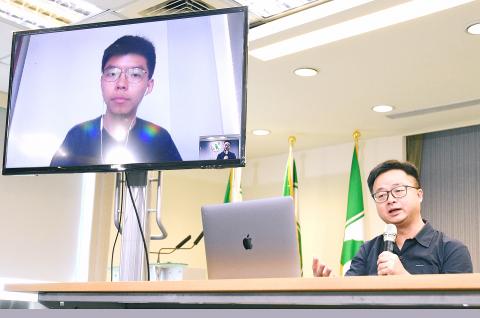Democratic Progressive Party (DPP) Secretary-General Luo Wen-jia (羅文嘉) yesterday spoke via video chat with Hong Kong democracy advocate Joshua Wong (黃之鋒) about the state of Hong Kong under Beijing’s “one country, two systems” formula.
Luo said he wanted to express his support for Hong Kong advocates, who continue to protest changes to its extradition law that would allow the Hong Kong government to extradite suspects to China to face trial there.
He also conveyed to Taiwanese politicians across party lines the message that the “one country, two systems” formula is not suitable for Taiwan, Luo said, adding that on this point, there was no room for confusion.

Photo: George Tsorng, Taipei Times
Wong expressed concern that 22 years after the handover of Hong Kong to Beijing, the “one country, two systems” framework has already failed and has become “one country, one system,” Luo said.
The situation has worsened since Chinese President Xi Jinping (習近平) took office, Luo quoted Wong as saying, adding that Xi exerted increasingly greater pressure on Hong Kong.
Xi is obviously increasing the pressure on Taiwan, he said.
Many young people have been arrested in Hong Kong and charged with criminal offenses after participating in pro-democracy demonstrations, Wong was quoted as saying.
He has been jailed three times in what has been widely seen as attempts by the Hong Kong government to silence dissent, he said.
The ejection of pro-democracy lawmakers from the Hong Kong Legislative Council and shrinking protest rights are evidence that the “one country, two systems” formula has failed, he said.
The council has 70 lawmakers, of which only 35 are elected, and many of the remaining are either pro-Beijing or otherwise manipulated by China, Luo quoted Wong as saying.
He and other advocates hope for all 70 councilors to be directly elected by Hong Kongers, he said.
The territory’s chief executive, who is elected by 1,200 people, should also be chosen through popular vote by all of Hong Kong’s voting-age residents, he said.
Hong Kong has been fighting for the right to elect the chief executive through popular vote for 20 years and has not been successful, he said, adding that he and other advocates will continue to fight until Hong Kong has a democratic system, “just like Taiwan has.”
Wong is thankful for Taiwan’s attention to the issues in Hong Kong and implored Taiwan’s current and future leaders to pay attention to the state of “one country, two systems” in Hong Kong, Luo said.
“One country, two systems” cannot be practically implemented in Taiwan, he said.
Hopefully, Taiwan and Hong Kong can stand together against pressure from Beijing and fight for the protection of democracy and freedom, he said.

The Mainland Affairs Council (MAC) today condemned the Chinese Communist Party (CCP) after the Czech officials confirmed that Chinese agents had surveilled Vice President Hsiao Bi-khim (蕭美琴) during her visit to Prague in March last year. Czech Military Intelligence director Petr Bartovsky yesterday said that Chinese operatives had attempted to create the conditions to carry out a demonstrative incident involving Hsiao, going as far as to plan a collision with her car. Hsiao was vice president-elect at the time. The MAC said that it has requested an explanation and demanded a public apology from Beijing. The CCP has repeatedly ignored the desires

Many Chinese spouses required to submit proof of having renounced their Chinese household registration have either completed the process or provided affidavits ahead of the June 30 deadline, the Mainland Affairs Council (MAC) said on Thursday. Of the 12,146 people required to submit the proof, 5,534 had done so as of Wednesday, MAC deputy head and spokesperson Liang Wen-chieh (梁文傑) said. Another 2,572 people who met conditions for exemption or deferral from submitting proof of deregistration — such as those with serious illnesses or injuries — have submitted affidavits instead, he said. “As long as individuals are willing to cooperate with the legal

The Ma-anshan Nuclear Power Plant’s license has expired and it cannot simply be restarted, the Executive Yuan said today, ahead of national debates on the nuclear power referendum. The No. 2 reactor at the Ma-anshan Nuclear Power Plant in Pingtung County was disconnected from the nation’s power grid and completely shut down on May 17, the day its license expired. The government would prioritize people’s safety and conduct necessary evaluations and checks if there is a need to extend the service life of the reactor, Executive Yuan spokeswoman Michelle Lee (李慧芝) told a news conference. Lee said that the referendum would read: “Do

Taiwan's Vice President Hsiao Bi-khim (蕭美琴) said Saturday that she would not be intimidated by the Chinese Communist Party (CCP), following reports that Chinese agents planned to ram her car during a visit to the Czech Republic last year. "I had a great visit to Prague & thank the Czech authorities for their hospitality & ensuring my safety," Hsiao said on social media platform X. "The CCP's unlawful activities will NOT intimidate me from voicing Taiwan's interests in the international community," she wrote. Hsiao visited the Czech Republic on March 18 last year as vice president-elect and met with Czech Senate leadership, including